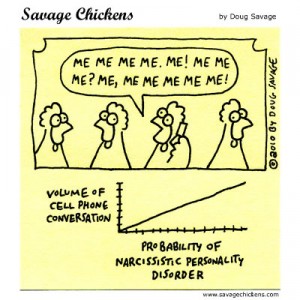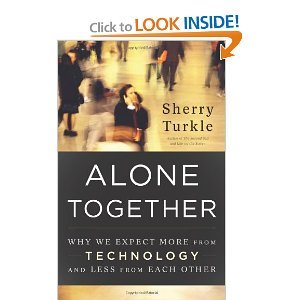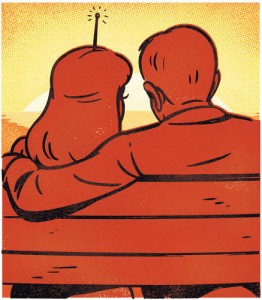Vertically walleyed: A new affliction, an occupational hazard for the digitally connected and cool, a neologism of sorts coined right here and right now.
“My students tell me about an important new skill: it involves maintaining eye contact with someone while you text someone else; it’s hard, but it can be done.”
That’s from a great NY Times article by Sherry Turkle, “The Flight from Conversation.” And this advice has expanded my notion of what’s fittin’ and what ain’t in this modern digital age. And it has led me to wonder how many other surprising rules of courteous, or at least cool, behavior I might collect.
More rules for the cool and maybe even courteous
What follows isn’t as interesting as Turkle’s observations, but maybe it’ll encourage others to ante up rules of their own.
 One rule that’s needed, in my opinion, and evidently in Doug Savage’s: If you’re going to use your phone in a public place, try to find somewhere you won’t disturb others.
One rule that’s needed, in my opinion, and evidently in Doug Savage’s: If you’re going to use your phone in a public place, try to find somewhere you won’t disturb others.
Also in terms of telephone etiquette, I believe it’s becoming increasingly accepted that you should send an SMS first, asking whether it’s okay to interrupt with a phone call. Mind you, my own experience suggests that, more and more, all that ensues is an exchange of SMSs, with emoticons doing a wan job of substituting for non-verbal input.
Here’s another situation that has yet to find its proper etiquette. More and more often, these days, you find yourself in the middle of some classic “absent presence” situation. You may be parked in a restaurant with four or five friends, e.g., and they’ve all buggered off somewhere via their iPhones and iPads, except for one who’s asleep; and you know you shouldn’t, but you yourself enter into an SMS exchange with your brother in Vancouver.
Before doing this, however, you announce, “I really do apologize. I know this is rude, and a sign of the times, with civility being corroded by all our gadgetry and digital connectedness combined with effective absence and everything, but I do have to take just a minute, okay? I have to say something to my brother in Vancouver.”
Whatever, eh? Nobody’s really there anyway, so they haven’t heard what you said and, even if they have, they merely wonder at your eccentricity and take to thumbing their keyboards even more furiously. (See my earlier post, “From absent presence to omnipresence.”)
Then there are the people who, right in the middle of what you thought was a conversation, will hop onto smartphone or tablet computer to seek the answer to a question, maybe provide a gloss on something they’ve just told you. Let’s say you’ve never heard of Rachel Weisz. Next thing you know you’re being presented with photos of her in various states of dress, with a Wikipedia bio, maybe even with her phone number. Wait. Did the first outbreak of “Saturday Night Fever” occur in 1977 or 1978? Just hang on a sec’. Not that you really give a damn, but the answer will arrive momentarily.
This kind of thing doesn’t conduce to real conversation. What unfolds is more an exchange of information, rather than the exchange and mutual development of ideas. This is how Sherry Turkle, in the NY Times article cited above, characterizes real conversation: “In conversation we tend to one another [my italics]… We can attend to tone and nuance. In conversation, we are called upon to see things from another’s point of view.”
Technology eroding our native capacities?
The new modes of connectedness may be having uncertain effects on the way we think and our very capacities to do things. For example, there appears to be a growing inclination to rely on the Web as a one-stop shop for anything we need to know or remember. It reminds me of those who’ve grown up with calculators and see no need to remember the multiplication tables or how to perform long division. It reminds me of my longstanding reluctance to consult a thesaurus except as a last resort, since I’m afraid that too much dependence on it will gradually erode my native capacity to think creatively about word choice. In fact, the Web begins to resemble something like a collective memory and collective consciousness, and the main individual intelligence and experience we wind up cultivating may be skills needed to access the Cloud.
Prophets of doom vs. Pollyannas
All my doomsaying also reminds me of all the scholarly Pollyannas who perennially refer to Socrates and his warnings regarding the growing popularity of the written word. He was convinced this fad would eventually destroy our capacity to remember things on our own. Of course to some extent he was right, but there are good arguments to the effect that we’ve gained far more from written language than we’ve lost. And maybe today’s Pollyannas are right, and we’ll gain far more than we lose from the new technology and the concomitant changes in ourselves as individuals and communities.
Maybe. 🙂
Anyway, does anyone have other new rules for the digital age they’d like to propose? Just by way of priming the pump:
* How to Behave: New Rules for Highly Evolved Humans (Wired, 15/07/09).
* Rushkoff’s Rules for the Digital Age.
* Business Etiquette: The New Rules in a Digital Age (Google this for a PDF version).
Special bonus video: Here’s a somewhat dated interview with Sherry Turkle regarding what was then her new book Alone Together. 


Bill the Mathematician adds this: https://mail.google.com/mail/u/1/?shva=1#inbox/136e9604a2535982.